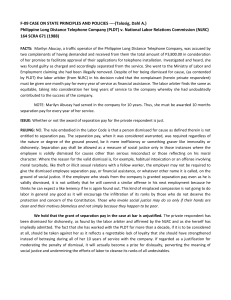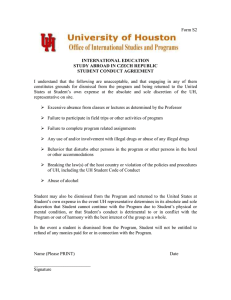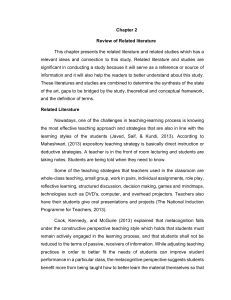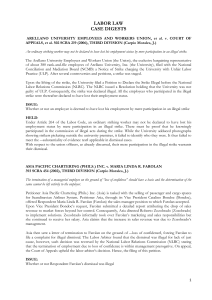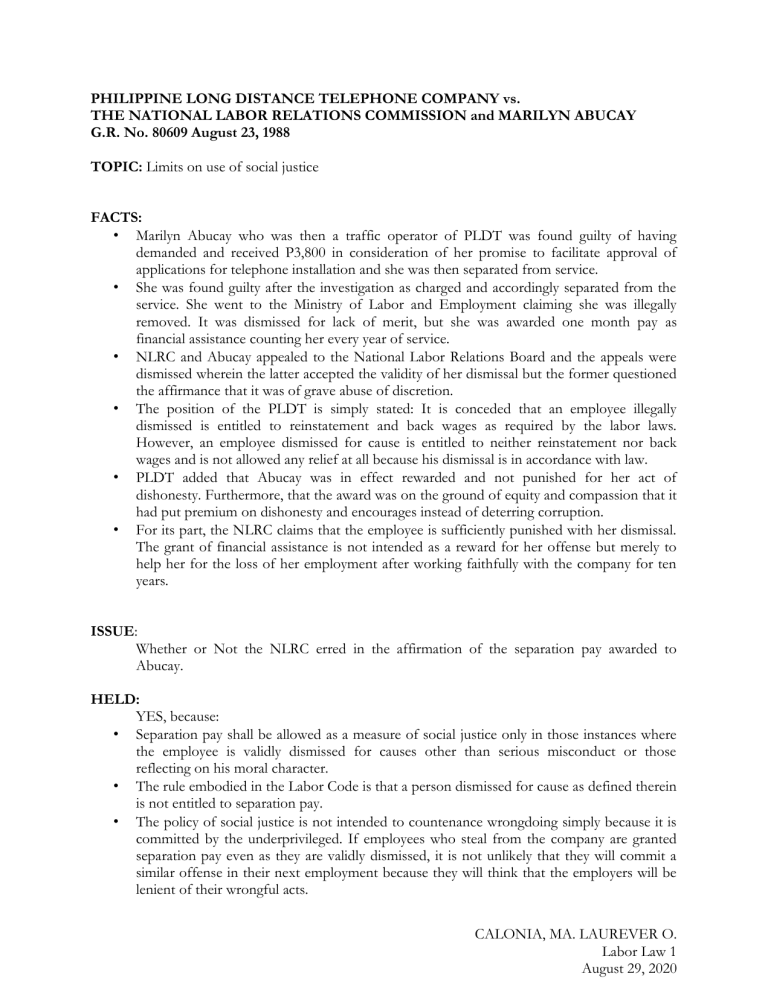
PHILIPPINE LONG DISTANCE TELEPHONE COMPANY vs. THE NATIONAL LABOR RELATIONS COMMISSION and MARILYN ABUCAY G.R. No. 80609 August 23, 1988 TOPIC: Limits on use of social justice FACTS: • Marilyn Abucay who was then a traffic operator of PLDT was found guilty of having demanded and received P3,800 in consideration of her promise to facilitate approval of applications for telephone installation and she was then separated from service. • She was found guilty after the investigation as charged and accordingly separated from the service. She went to the Ministry of Labor and Employment claiming she was illegally removed. It was dismissed for lack of merit, but she was awarded one month pay as financial assistance counting her every year of service. • NLRC and Abucay appealed to the National Labor Relations Board and the appeals were dismissed wherein the latter accepted the validity of her dismissal but the former questioned the affirmance that it was of grave abuse of discretion. • The position of the PLDT is simply stated: It is conceded that an employee illegally dismissed is entitled to reinstatement and back wages as required by the labor laws. However, an employee dismissed for cause is entitled to neither reinstatement nor back wages and is not allowed any relief at all because his dismissal is in accordance with law. • PLDT added that Abucay was in effect rewarded and not punished for her act of dishonesty. Furthermore, that the award was on the ground of equity and compassion that it had put premium on dishonesty and encourages instead of deterring corruption. • For its part, the NLRC claims that the employee is sufficiently punished with her dismissal. The grant of financial assistance is not intended as a reward for her offense but merely to help her for the loss of her employment after working faithfully with the company for ten years. ISSUE: Whether or Not the NLRC erred in the affirmation of the separation pay awarded to Abucay. HELD: YES, because: • Separation pay shall be allowed as a measure of social justice only in those instances where the employee is validly dismissed for causes other than serious misconduct or those reflecting on his moral character. • The rule embodied in the Labor Code is that a person dismissed for cause as defined therein is not entitled to separation pay. • The policy of social justice is not intended to countenance wrongdoing simply because it is committed by the underprivileged. If employees who steal from the company are granted separation pay even as they are validly dismissed, it is not unlikely that they will commit a similar offense in their next employment because they will think that the employers will be lenient of their wrongful acts. CALONIA, MA. LAUREVER O. Labor Law 1 August 29, 2020 • • The petition was granted. Except for the grant of separation pay in the form of financial assistance, which is hereby DISALLOWED “Applying the above considerations, we hold that the grant of separation pay in the case at bar is unjustified. The private respondent has been dismissed for dishonesty, as found by the labor arbiter and affirmed by the NLRC and as she herself has impliedly admitted. The fact that she has worked with the PLDT for more than a decade, if it is to be considered at all, should be taken against her as it reflects a regrettable lack of loyalty that she should have strengthened instead of betraying during all of her 10 years of service with the company. If regarded as a justification for moderating the penalty of dismissal, it will actually become a prize for disloyalty, perverting the meaning of social justice and undermining the efforts of labor to cleanse its ranks of all undesirables. The Court also rules that the separation pay, if found due under the circumstances of each case, should be computed at the rate of one month salary for every year of service, assuming the length of such service is deemed material. This is without prejudice to the application of special agreements between the employer and the employee stipulating a higher rate of computation and providing for more benefits to the discharged employee.” CALONIA, MA. LAUREVER O. Labor Law 1 August 29, 2020
